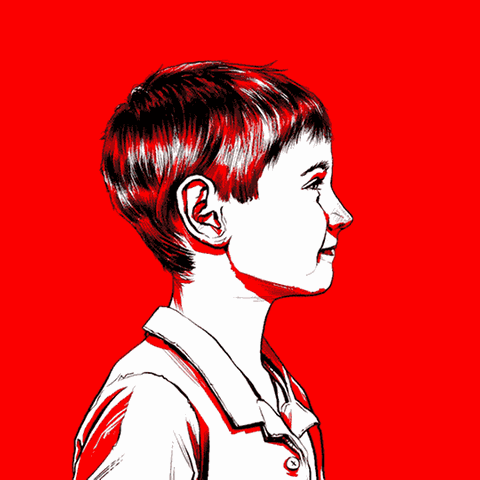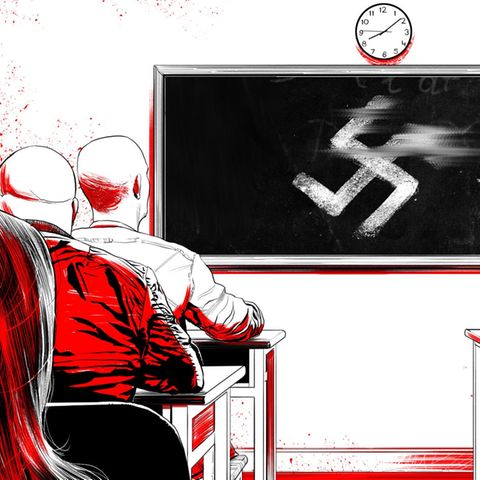Opinion
So the AfD will definitely not be smaller
Copy the current link
Add to the memorial list
The Federal Constitutional Protection classifies the AfD as “secured right -wing extremist movement”. A failed federal government is thus continuing a failed strategy.
This Friday, four days before the alleged swearing -in of a new Chancellor, the outgoing Federal Minister of the Interior announced that the largest opposition party was right -wing extremist. Or in the language of the authorities: The Federal Office for the Protection of the Constitution classifies the AfD as a “secured extremist movement”.
The Federal Party-like the state associations of Saxony, Thuringia and Saxony-Anhalt-has thus completed the career from testing over the suspicion in the event of a observation. The protection of the constitution, i.e. the state, can now monitor with all the intelligence agents available to it.
Right is: the AfD is a partially right -wing extremist party. It has ideological and personal connections into the violent scene. And it is a party that endangers the democratic system.
And yet a lot seems questionable to this now announced decision: the circumstances, the reason – and above all the strategy. In this way, the AfD will definitely not be smaller.
The circumstances: SPD Interior Minister Nancy Faeser published an expert opinion on Friday as one of her last official acts that intervenes deeply into the work and establishment of the future federal government. Regardless of whether the decision is agreed with CSU successor Alexander Dobrindt or not: the time is fatal.
Faeser had not published the expert opinion for months for good reasons for good reasons in the Bundestag election campaign or during the coalition negotiations. The fact that she gave up this reluctance in the last days of her office literally invites you to unmounted speculation.
But not only the time is questionable. The report was drawn up under ex-Constitution President Thomas Haldenwang, who spontaneously decided in November to go to the Bundestag for the CDU. The candidacy de facto highlighted the dividing line between party politics and the protection of the constitution. The fact that Haldewang had his office rest does not change the fact that the report is burdened.
And the reason? The protection of the constitution announced on Friday: “The ethnic-bound-like understanding of the folk in which the party prevails is not compatible with the free democratic basic order.” It aims to “exclude certain population groups from an equal social participation” and to devalue them. Specifically, it affects migrants from Muslim states.
This analysis can hardly be derived from the program, but all the more from internal and public statements from AfD officials. The Higher Administrative Court in Münster rightly found a year ago.
And the report remains secret
Nevertheless, it is a political decision in the end. The classification of the entire overall party as “secured right -wing extremist” looks even more blurred than the classification of a regional association in Thuringia, which is led by a flawless right -wing extremist like Björn Höcke. Even more opaque makes the process that the report should not be published.
Otherwise, the example of Höcke impressively shows that the previous strategy does not work. Because it is the Thuringian regional association that has been the case for years. In the Erfurt state parliament, the AfD faction occupies more than a third of the seats; in the Bundestag election, the Thuringian AfD came to more than 38 percent.
In short: the longer and more intensive the protection of the constitution observes the AfD, the stronger it becomes. First of all, this is just a correlation. But maybe it would be necessary to finally think seriously about a causal connection – and to ask the necessary questions louder.
The victim narrative of the AfD
For example, this: Is it really good that a parliamentary party politically classifies and monitors a subordinate interior authority that has a long scandal history? Or this: is it further weakened people’s trust in democratic competition and state institutions? Or this: Does the AfD tell that it is the victim of an alleged “cartel”, not an involuntary confirmation?
Certainly, there are no simple answers. But instead of starting a fruitless debate about a ban on partying again, a lot more should be talked about what exactly makes the AfD bigger and what conclusions are to be drawn from it, politically, legally and communicative. After all, if it goes really wrong, there could be the first AfD government in Saxony-Anhalt next year.
Because it is like this: The Federal Government, which previously belonged to the Interior Minister Faeser, failed as well as her approach to the enemies of open society. The traffic light coalition is largely responsible for the fact that the AfD is by far the largest opposition group in the Bundestag. Faeser has now made the last post of this sad record with the publication of the report.
Source: Stern
I have been working in the news industry for over 6 years, first as a reporter and now as an editor. I have covered politics extensively, and my work has appeared in major newspapers and online news outlets around the world. In addition to my writing, I also contribute regularly to 24 Hours World.







